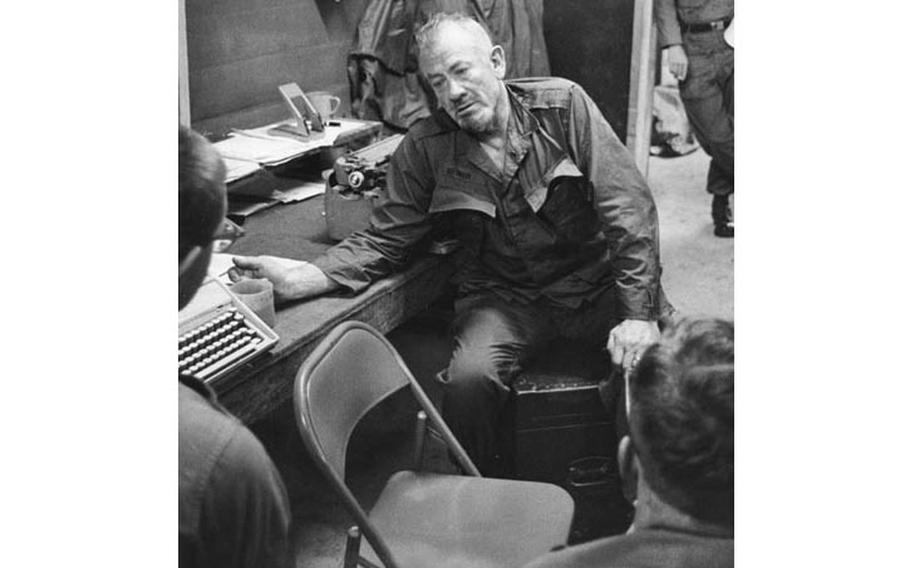
Novelist John Steinbeck talks to soldiers at An Khe, South Vietnam, in December, 1966. (Ray Belford/Stars and Stripes)
AN KHE, Vietnam — Nobel Prize-winning author John Steinbeck sat on a little old green box and spoke out with a manner that seemed as though his chin were tied to his chest. When he spoke, his whole face seemed to speak.
"Six months ago I was sorry that my sons had to go into the Army," Steinbeck told a small group of enlisted men here. "But then, by God! six months later I am proud of them because they are men. Men are really valuable things today."
Steinbeck's son, John Jr., is stationed at Pleiku with the Armed Forces Radio and Television Service. Steinbeck also has another son serving in the Army at Fort Ord, Cal.
Steinbeck laughed along when he was asked about a question. raised by a popular national magazine: Is the United States locked in a hopeless war?
"That is a most ridiculous question," he said. "All wars are hopeless, but all of the wars have been necessary and this one is also necessary," Steinbeck said.
Steinbeck is currently in Vietnam to write about the war. "I won't be writing about the technical side of the war or anything like that. I don't have the time to learn all that I would need to know about it. It would take the rest of my lifetime to do such a thing," he said. "I am only going to write my impressions of the war and I don't have any deadlines or any assignments to write about."
Steinbeck is in Vietnam for an indefinite period.
"I don't mind answering questions about my personal life as long as they are not too personal;" he said, "That's my own business."
"The story about me being an odd job man throughout my life is not entirely true," he said. "I have held jobs as a longshoreman and I have lived with farmers and picked cotton, but many of the jobs I've been reputed to have done are exaggerations."
Steinbeck also said that all of his books have been written in longhand. "I don't type," he said.
Steinbeck indicated that he didn't think that he had a style.
"I guess if anyone sits down and writes a million words they are bound to fall into some sort of pattern. I don't worry about style, however, I just write," he said.
"I don't believe that any writer can write to the masses," he said "I write to one person."
"That one person was a very old and dear friend of mine, whose mind I respected very much," Steinbeck said.
Alicia Patterson was the person Steinbeck referred to. She was the daughter of the founder of the Chicago Tribune and Newsday. She died a few years ago.
Steinbeck was asked if he had ever written any books just for the sake of writing a book and he said, "Yes, all of them."
After talking for two hours and two cups of coffee, Steinbeck excused himself to go to bed.
"Some of the questions that you asked I wouldn't have answered of most people, but I admire what you kids are doing here and I think that I owe you that respect," he said.
One of the enlisted men's impression of Steinbeck summed up the feelings of most of those who had talked for two hours with the popular writer. "He just seems to radiate greatness," he said.
Many more enlisted men throughout Vietnam will have a chance to meet and talk with the famous author because he has given instructions to his escorts that he doesn't want to just be around the brass. "I like to talk to people that don't outrank me," he said.